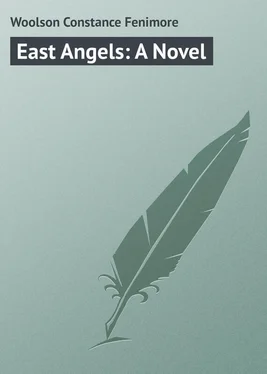Constance Woolson - East Angels - A Novel
Здесь есть возможность читать онлайн «Constance Woolson - East Angels - A Novel» — ознакомительный отрывок электронной книги совершенно бесплатно, а после прочтения отрывка купить полную версию. В некоторых случаях можно слушать аудио, скачать через торрент в формате fb2 и присутствует краткое содержание. Жанр: foreign_prose, на английском языке. Описание произведения, (предисловие) а так же отзывы посетителей доступны на портале библиотеки ЛибКат.
- Название:East Angels: A Novel
- Автор:
- Жанр:
- Год:неизвестен
- ISBN:нет данных
- Рейтинг книги:5 / 5. Голосов: 1
-
Избранное:Добавить в избранное
- Отзывы:
-
Ваша оценка:
- 100
- 1
- 2
- 3
- 4
- 5
East Angels: A Novel: краткое содержание, описание и аннотация
Предлагаем к чтению аннотацию, описание, краткое содержание или предисловие (зависит от того, что написал сам автор книги «East Angels: A Novel»). Если вы не нашли необходимую информацию о книге — напишите в комментариях, мы постараемся отыскать её.
East Angels: A Novel — читать онлайн ознакомительный отрывок
Ниже представлен текст книги, разбитый по страницам. Система сохранения места последней прочитанной страницы, позволяет с удобством читать онлайн бесплатно книгу «East Angels: A Novel», без необходимости каждый раз заново искать на чём Вы остановились. Поставьте закладку, и сможете в любой момент перейти на страницу, на которой закончили чтение.
Интервал:
Закладка:
He was a man by no means easily pleased. He could not, therefore, always believe that other people were sincere when they were so unlike himself – so much more readily pleased, for instance, with him, than he was with them. For he was essentially modest at heart; though obstinate in many of his ideas, he had not that assured opinion of himself, that solidly installed self-approbation, which men in his position in America (possessed of large fortunes which they have gained for the most part by their own talent) are apt, though often unconsciously, to cherish. As he was fastidious, it was no pleasure to him to taste the open advantages of his position; they were too open, he did not care for things so easily gained. And when these advantages were presented to him in feminine eyes and smiles, or a feminine handwriting, he could not even take a jocular view of it. For though he was a man of the world, he was not (this was another of his secrets) in the least blasé; he had his ideal of what the best of life should be, and he kept it like a Madonna in its shrine. When, therefore, this ideal was pulled by force from its niche, or, worse still, stepped down of its own accord, he was immensely disgusted, he felt a sense of personal injury, as if the most precious feelings of life had been profaned. He had believed in this woman, perhaps, to the extent of supposing her sweet and womanly; yet here she was thinking – yes, without doubt thinking (either for herself or for some one else) of the benefits which his position could confer. That the little advances she had made had been microscopically small, only made the matter worse; if she had enough of refinement to make them so delicate, she should have had enough to not make them at all. It was characteristic of this man that he never at such times thought that the offender might be actuated by a real liking for himself – himself apart from this millstone of his excellent reputation and wealth; this was a feature of the personal modesty that belonged to him. A man less modest (that is, the great majority of men), placed in a position similar to his, would have been troubled by no such poverty of imagination.
It must, however, be added that this modesty of Winthrop's was strictly one of his inner feelings, not revealed to the world at large. The world never suspected it, and had no reason for suspecting it; it had, indeed, nothing to do with the world, it was a private attribute. To the world he was a cool, quiet man, equally without pretensions and without awkwardnesses. One could not have told whether he thought well of himself – especially well – or not.
Why this man, so fully belonging to this busy, self-asserting nineteenth century, should have preserved so much humility in the face of his successes – success of fortune, of equilibrium, of knowledge, of accomplishment of purpose, of self-control – this would have been, perhaps, a question for the student of heredity. Was it a trait inherited from Puritan ancestors, some Goodman Winthrop of gentle disposition, a man not severe in creed or demeanor, nor firm in exterminating Indians, and therefore of small consequence in his day and community, and knowing it? Or was it a tendency inherited from some Dutch ancestress on the maternal side, some sweet little flaxen-haired great-grandmother, who had received in her maiden breast one of those deadly though unseen shafts – the shaft of slight – from which a woman's heart never wholly recovers?
But mental organizations are full of contradictions; looked at in another way, this deep, unexpressed personal humility in Evert Winthrop's nature, underneath his rather cold exterior, his keen mind and strong will, might almost have been called a pride, so high a demand did it make upon life. For if one has not attractive powers, love, when it does come, when it is at last believed in, has a peculiarly rich quality: it is so absolutely one's own!
The father of Evert Winthrop, Andrew Winthrop, was called eccentric during all his life. But it was an eccentricity which carried with it none of the slighting estimations which usually accompany the term. Andrew Winthrop, in truth, had been eccentric only in being more learned and more original than his neighbors; perhaps, also, more severe. He was a fair classical scholar, but a still better mathematician, and had occupied himself at various times with astronomy; he had even built a small observatory in the garden behind his house. But most of all was he interested in the rapid advance of science in general, the advance all along the line, which he had lived to see; he enjoyed this so much that it was to him, during his later years, what a daily draught of the finest wine is to an old connoisseur in vintages, whose strength is beginning to fail him. He once said to his son: "The world is at last getting into an intelligible condition. My only regret is that I could not have lived in the century which is coming, instead of in the one which is passing; but I ought not to complain, I have at least seen the first rays. What should I have done if my lot had been cast among the millions who lived before Darwin! I should either have become a bacchanalian character, drowning in stupid drinking the memory of the enigmas that oppressed me, or I should have fled to the opposite extreme and taken refuge in superstition – given up my intellect, bound hand and foot, to the care of the priests. The world has been in the wilderness, Evert, through all the ages of which we have record; now a clearer atmosphere is at hand. I shall not enter this promised land, but I can see its shining afar off. You, my son, will enter in; prize your advantages, they are greater than those enjoyed by the greatest kings, the greatest philosophers, one hundred years ago."
This Puritan without a creed, this student of science who used more readily than any other the language of the Bible, brought up his only child with studied simplicity; in all that related to his education, with severity. The little boy's mother had died soon after his birth, and Andrew Winthrop had mourned for her, the young wife who had loved him, all the rest of his life. But in silence, almost in sternness; he did not welcome sympathy even when it came from his wife's only sister, Mrs. Rutherford. And he would not give up the child, though the aunt had begged that the poor baby might be intrusted to her for at least the first year of his motherless life; the only concession he made was in allowing the old Episcopal clergyman who had baptized Gertrude to baptize Gertrude's child, and in tacitly promising that the boy should attend, if he pleased, the Episcopal Church when he grew older, his mother having been a devoted Churchwoman. He kept the child with him in the large, lonely New England house which even Gertrude Winthrop's sweetness had not been able to make fully home-like and warm. For it had been lived in too long, the old house, by a succession of Miss Winthrops, conscientious old maids with narrow chests, thin throats, and scanty little knobs of gray-streaked hair behind – the sort of good women with whom the sense of duty is far keener than that of comfort, and in whose minds character is apt to be gauged by the hour of getting up in the morning. There had always been three or four Miss Winthrops of this pattern in each generation; they began as daughters, passed into aunts, and then into grandaunts, as nieces, growing up, took their first positions from them. Andrew Winthrop himself had spent his childhood among a number of these aunts – aunts both simple and "grand." But the custom of the family had begun to change in his day; the aunts had taken to leaving this earthly sphere much earlier than formerly (perhaps because they had discovered that they could no longer attribute late breakfasts to total depravity), so that when, his own youth past, he brought his Gertrude home, there was not one left there; they were alone.
Читать дальшеИнтервал:
Закладка:
Похожие книги на «East Angels: A Novel»
Представляем Вашему вниманию похожие книги на «East Angels: A Novel» списком для выбора. Мы отобрали схожую по названию и смыслу литературу в надежде предоставить читателям больше вариантов отыскать новые, интересные, ещё непрочитанные произведения.
Обсуждение, отзывы о книге «East Angels: A Novel» и просто собственные мнения читателей. Оставьте ваши комментарии, напишите, что Вы думаете о произведении, его смысле или главных героях. Укажите что конкретно понравилось, а что нет, и почему Вы так считаете.












